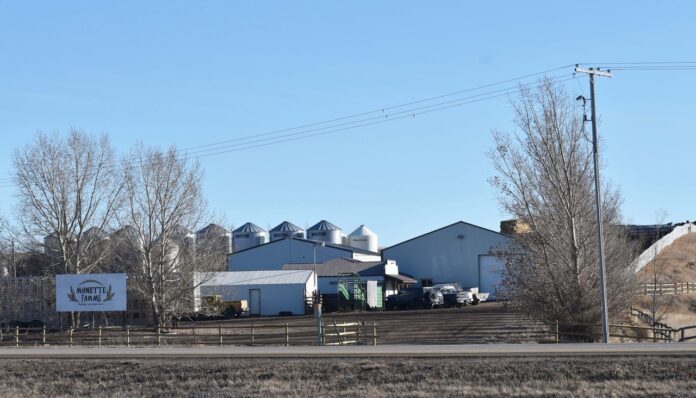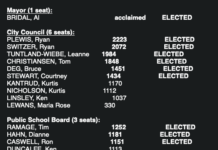By Matthew Liebenberg
The proposed expansion of a cattle feedlot near the village of Waldeck has created concerns among residents, but the company is confident it can be addressed through the implementation of various management measures on the site.
The operation is owned by Monette Farms and is located approximately 1.7 kilometres southwest of Waldeck next to the Trans-Canada Highway.
The company has submitted an application to the Saskatchewan Ministry of Agriculture to obtain approval under the intensive livestock provisions of the Agricultural Operations Act for waste storage and waste management plans for the feedlot.
The feedlot has existing approval for 2,000 feeder cattle, which is equal to 1,333 animal units (AU). This application is proposing the operation’s expansion to 4,500 feeder cattle (3,000 AU).
A group of concerned residents from the village began an online petition against the feedlot expansion in early January 2024. It has received 131 signatures until early February. The petition notes that the feedlot already has significant issues managing waste and cattle. They are therefore concerned that the proposed expansion might exacerbate those problems.
Waldeck resident Heather Bender started the online petition as a way to highlight the concerns of community members after information about the proposed expansion was shared on the Waldeck community group Facebook page.
“Somebody had shared it on the community page for discussion to see what everybody else seemed to think about it and it was quite the conversation piece,” she recalled. “Lots of people had opinions about it and most were environmental concerns and things like that. So I figured maybe we need a voice. I’m not sure where we can go with the petition and if it will even make a difference, but at least it was something to record the fact that we do not necessarily want this close to our community.”
She felt the response to the petition has been pretty good, especially considering that Waldeck only has a population of 294.
“Our major concern is the environmental impact on the groundwater and the surrounding area,” she said. “I’m not sure in which direction it would flow. Is that going to come towards Waldeck? There’s been numerous incidences where they’ve had excrement seeping through broken fence boards into the ditch towards the No. 1 [Highway] there.”
The location of the feedlot next to the Trans-Canada Highway means there is also a concern about escaped cattle causing a danger to traffic, which can be a potentially higher risk when there are more animals.
The smell from the feedlot can occasionally be an issue in the village, depending on the direction of the wind and the activities at the operation. The proximity of an expanded feedlot operation is therefore a concern with regard to its potential impact on property values in the village.
There have been public notices about the application by Monette Farms to expand the feedlot, but she felt the company should have done more to inform the community about their intention.
“I was a little concerned that they hadn’t even made a petition or had come to the village and said they’re looking at doing this,” she noted. “They had no interest in bringing it forth to the community and saying ‘Hey, look, this is what we’re planning to do, just a heads up or are there any concerns that we could address?’ There’s been nothing.”
The concerns of community members about the proposed feedlot expansion have been shared with the local MLA as well as with the Saskatchewan Ministry of Agriculture office in Swift Current. The intention is to also take the petition to the Village of Waldeck council.
Clay Emms of Monette Farms is the contact person for the company’s application to the Ministry of Agriculture. The company acquired the feedlot near Waldeck about two years ago and this application is aimed at implementing measures to protect water resources and to adhere to provisions in the Agricultural Operations Act.
“We’re improving that location,” he said. “It’s going to be more environmentally friendly, that’s for sure. It’ll be better containment. It’s all been engineered.”
He indicated the company cannot provide further comment on this application while it is still open for review and under consideration by the Ministry of Agriculture.
“They will look at the application and then make their decision,” he said. “They go through all the concerns and then they revisit it from that point, once the referral is done. And then, I don’t know how long it’ll take before we get an answer, but they still revisit it for a while afterwards from what I’m understanding.”
The public notice for this application indicates that a copy of the company’s submission can be reviewed at the Saskatchewan Agriculture office in Swift Current and written comments must be received prior to Feb. 12.
The submitted documentation for the application indicates that Monette Farms commissioned WaterMark Consulting Ltd, an engineering consulting company, in the spring of 2023 to conduct a site study for the proposed expansion of the feedlot operation.
The company’s final report to Monette Farms is dated Dec. 1, 2023 and the company’s signed application to the Ministry of Agriculture is dated Dec. 12.
The application includes details about the subsurface investigation and provides information about waste storage and runoff control plans for the expanded feedlot operation.
The geology and soil profile of the site will provide natural containment, which is sufficient for local groundwater flow system protection. However, the changing elevation of the site means there will be a significant risk of surface water impact without appropriate measures.
The report identifies three primary drainage areas on the site associated with the existing northern and southern feedlot pens and the proposed expansion pen. There will be a runoff management plan to manage and contain surface water runoff from all three areas.
There will be three holding ponds to contain pen drainage from the entire feedlot footprint. All manure must be stockpiled within the holding pond collection areas.
It is calculated that the expanded feedlot will produce 22,338,000 kilograms of solid manure each year when it operates at maximum capacity. Manure will initially be stockpiled in the pens and will be spread on land in the spring. Monette Farms indicated it has 4,168 acres available to be used for manure spreading.
The application includes a mortality management plan for the site with a 50-year burial plan. The expanded feedlot operation is expected to have approximately 45 AU mortalities each year. Dead animals will be buried in a trench system in an area provided for this purpose. Carcasses will be buried four metres deep and covered immediately. An area is also identified for four-metre-deep trenches to bury animals when a mass mortality incident occurs.






